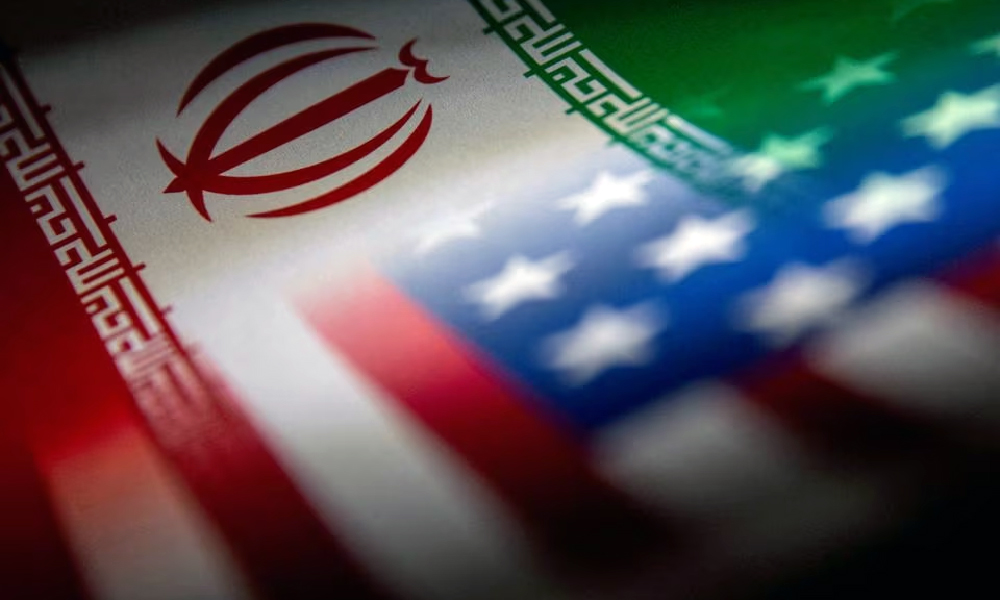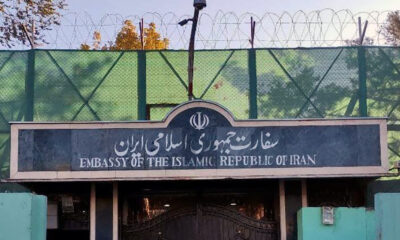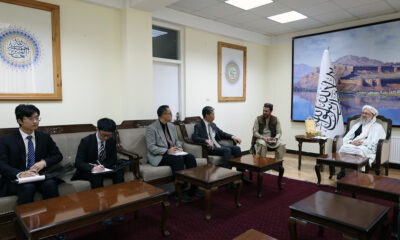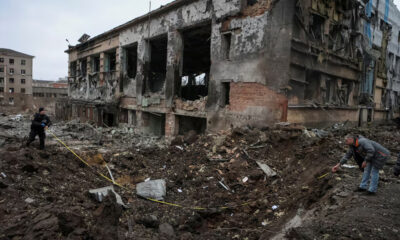Regional
US allows $6 billion transfer as part of Iran prisoner swap

The United States waived sanctions to allow the transfer of $6 billion in Iranian funds from South Korea to Qatar, a step needed to carry out a previously announced U.S.-Iran prisoner swap, according to a U.S. document seen by Reuters on Monday.
The broad outlines of the U.S.-Iran deal under which five U.S. citizens detained by Iran would be allowed to leave in exchange for the transfer of the funds and the release of five Iranians held in the United States were made public on Aug. 10.
According to the State Department document seen by Reuters, Secretary of State Antony Blinken determined that waiving the sanctions was in the national security interests of the United States.
The document sent to U.S. congressional committees marks the first time the U.S. government has formally acknowledged it is releasing five Iranians detained in the United States as part of the agreement to secure the freedom of the five U.S. citizens, read the report.
“To facilitate their release, the United State has committed to release five Iranian nationals currently detained in the United States and to permit the transfer of approximately $6 billion in Iranian funds held in restricted accounts in the (Republic of Korea) to restricted accounts in Qatar, where the funds will be available only for humanitarian trade,” it said.
The document said the transfer of funds would only provide “limited benefit to Iran” since the funds can only be used for humanitarian trade.
“Allowing these funds to be transferred from restricted Iranian accounts held in the (Republic of Korea) to accounts in Qatar for humanitarian trade is necessary to facilitate the release of these U.S. citizens,” the document said.
White House spokesperson Adrienne Watson said in a statement late on Monday that Blinken, on Sept. 8, had undertaken “a procedural step in an ongoing process to ensure Iranian funds can move from one restricted account to another and remain restricted to humanitarian trade.”
She said the administration had kept Congress informed from the start of the process.
“As we have said from the outset, what is being pursued here is an arrangement wherein we secure the release of 5 wrongfully held Americans. This remains a sensitive and ongoing process,” she said. “While this is a step in the process, no individuals have been or will be released into U.S. custody this week.”
The transfer of the $6 billion and the prisoner exchange could take place as early as next week, according to eight Iranian and other sources familiar with the negotiations, read the report.
The waiver applies to certain financial institutions that fall under the primary jurisdiction of Germany, Ireland, Qatar, South Korea and Switzerland to engage in transactions with the National Iranian Oil Company, the Central Bank of Iran and other Iranian financial institutions under U.S. sanctions, it added.
Regional
Dubai ruler approves new $35 billion airport terminal

Dubai’s ruler Sheikh Mohammed bin Rashid al-Maktoum approved a new passenger terminal in Al Maktoum International airport worth 128 billion AED ($34.85 billion), he said on Sunday in a post on X.
The Al Maktoum International Airport will be the largest in the world with a capacity of up to 260 million passengers, and five times the size of Dubai International Airport, he added, saying that all operations at Dubai airport would be transferred to Al Maktoum in the coming years, Reuters reported.
The Al Maktoum airport will also include 400 terminal gates and five runways, he said.
The airport will be the new home of flagship carrier Emirates and its sister low-cost airline Flydubai along with all airline partners connecting the world to and from Dubai, Dubai state-owned airline Emirates chairman Sheikh Ahmed bin Saeed al-Maktoum said.
The move “further solidifies Dubai’s position as a leading aviation hub on the world stage”, the CEO of Dubai Airports, Paul Griffiths, was quoted as saying by the Dubai Media Office.
Regional
Iraq criminalises same-sex relationships with maximum 15 years in prison

Iraq’s parliament passed a law criminalising same-sex relationships with a maximum 15-year prison sentence on Saturday, in a move it said aimed to uphold religious values but was condemned by rights advocates as the latest attack on the LGBT community in Iraq.
The law aims to “protect Iraqi society from moral depravity and the calls for homosexuality that have overtaken the world,” Reuters reported citing a copy of the law.
It was backed mainly by conservative Shi’ite Muslim parties who form the largest coalition in mainly Muslim Iraq’s parliament.
The Law on Combating Prostitution and Homosexuality bans same-sex relations with at least 10 years and a maximum of 15 years in prison, and mandates at least seven years in prison for anybody who promotes homosexuality or prostitution.
It also imposes between one and three years in prison for anyone who changes their “biological gender” or wilfully dresses in an effeminate manner.
The bill had initially included the death penalty for same-sex acts but was amended before being passed after strong opposition from the United States and European nations.
Until Saturday, Iraq didn’t explicitly criminalise gay sex, though loosely defined morality clauses in its penal code had been used to target LGBT people, and members of the community have also been killed by armed groups and individuals.
“The Iraqi parliament’s passage of the anti-LGBT law rubber-stamps Iraq’s appalling record of rights violations against LGBT people and is a serious blow to fundamental human rights,” Rasha Younes, deputy director of the LGBT rights programme at Human Rights Watch, told Reuters.
Iraqi officials who oversee human rights could not immediately be reached for comment.
Major Iraqi parties have in the past year stepped up criticism of LGBT rights, with rainbow flags frequently being burned in protests by both ruling and opposition conservative Shi’ite Muslim factions last year.
More than 60 countries criminalise gay sex, while same-sex sexual acts are legal in more than 130 countries, according to Our World in Data.
Regional
China to host Hamas, Fatah for Palestinian unity talks

China will host Palestinian unity talks between Hamas and its rivals Fatah, the two groups and a Beijing-based diplomat said on Friday, a notable Chinese foray into Palestinian diplomacy amid the war in the Gaza Strip.
Hamas, which controls Gaza, is the group whose fighters stormed into Israeli towns on Oct. 7, killing 1,200 people and capturing 253 hostages. Israel has sworn to annihilate Hamas in an onslaught that has killed more than 34,000 Palestinians.
Fatah is the movement of Mahmoud Abbas, president of the Western-backed Palestinian Authority, which exercises limited self-rule in the Israeli occupied West Bank.
The two rival Palestinian factions have failed to heal their political disputes since Hamas fighters expelled Fatah from Gaza in a short war in 2007. Washington is wary of moves to reconcile the two groups, as it supports the PA but has banned Hamas as terrorists.
A Fatah official told Reuters a delegation, led by the group’s senior official Azzam Al-Ahmed, had left for China. A Hamas official said the faction’s team for the talks, led by senior Hamas official Moussa Abu Marzouk, would be flying there later on Friday.
“We support strengthening the authority of the Palestinian National Authority, and support all Palestinian factions in achieving reconciliation and increasing solidarity through dialogue and consultation,” said Chinese Foreign Ministry spokesperson Wang Wenbin at a regular briefing on Friday, without confirming the meeting.
The visit will be the first time a Hamas delegation is publicly known to have gone to China since the start of the war in Gaza. A Chinese diplomat, Wang Kejian, met Hamas chief Ismail Haniyeh in Qatar last month, according to the Chinese foreign ministry.
The Beijing-based diplomat, who had been briefed on the matter, said the talks aimed to support efforts to reconcile the two Palestinian rival groups.
China has lately demonstrated growing diplomatic influence in the Middle East, where it enjoys strong ties with Arab nations and Iran. Last year, Beijing brokered a breakthrough peace deal between longstanding regional foes Saudi Arabia and Iran.
U.S. Secretary of State Antony Blinken said he discussed with Chinese President Xi Jinping and other officials in Beijing on Friday how China can play a constructive role in global crises, including the Middle East.
Chinese officials have ramped up advocacy for the Palestinians in international forums in recent months, calling for a larger-scale Israeli-Palestinian peace conference and a specific timetable to implement a two-state solution.
In February, Beijing urged the International Court of Justice (ICJ) to give its opinion on the Israeli occupation of the Palestinian Territories, which it said was illegal.
More recently, China has been pushing for Palestine to join the United Nations, which Beijing’s top diplomat Wang Yi said last week would “rectify a prolonged historical injustice”.
(Reuters)
-

 Sport4 days ago
Sport4 days agoAfghanistan beat Iraq 5-3, inch closer to Futsal World Cup berth
-

 Regional4 days ago
Regional4 days agoNew UK sanctions target Iranian drone industry
-

 Latest News4 days ago
Latest News4 days agoEU allocates 17 million euros to support Afghans on the move
-

 Latest News3 days ago
Latest News3 days agoPakistan extends registered Afghan refugees’ stay till June 30
-

 World5 days ago
World5 days agoUS student protests over Gaza intensify despite arrests
-

 Regional3 days ago
Regional3 days agoChina to host Hamas, Fatah for Palestinian unity talks
-

 Sport2 days ago
Sport2 days agoAfghanistan qualify for FIFA Futsal World Cup for first time ever
-

 Sport5 days ago
Sport5 days agoIndia’s Pant boosts World Cup hopes with IPL batting blitz

























